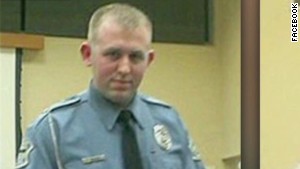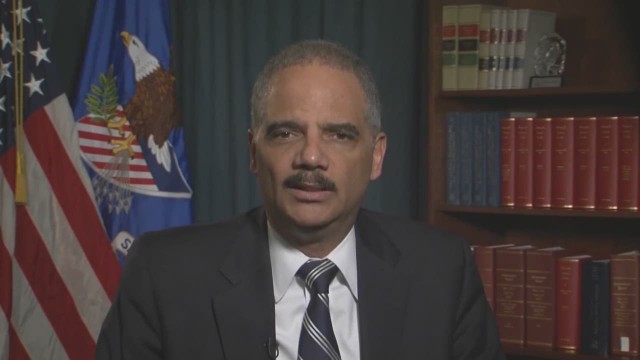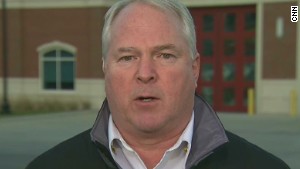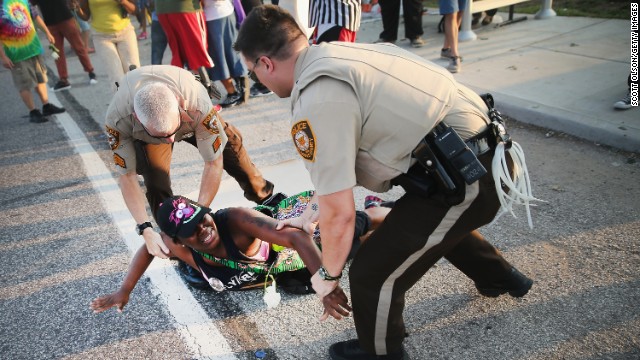STORY HIGHLIGHTS
- NEW: A number of businesses have boarded their doors and windows
- President Barack Obama says violence is contrary "to who we are"
- FBI sends extra personnel to the St. Louis area, official says
- The Ferguson police officer who and killed Michael Brown says he did nothing wrong
Ferguson, Missouri (CNN) -- President Barack Obama joined the call for calm with word a Missouri grand jury considering whether to indict Officer Darren Wilson in the death of Michael Brown was close to making a decision.
"This is a country that allows everybody to express their views. Allows them to peacefully assemble, to protest actions that they think are unjust," the President told ABC News in an interview excerpt broadcast on Friday.
"But using any event as an excuse for violence is contrary to rule of law and contrary to who we are."
 Officer Darren Wilson plans to resign
Officer Darren Wilson plans to resign Attorney Gen. announces new guidelines
Attorney Gen. announces new guidelines Ferguson chief: 'I can see this through'
Ferguson chief: 'I can see this through'The President's comments came as the grand jury considers whether to bring charges against Wilson, who is in the final stages of negotiations with Ferguson city officials to resign, sources close to the talks told CNN.
Wilson has maintained he's done nothing wrong, and the resignation talks have hinged on whether he is indicted, the sources said.
While Wilson has told associates he would resign to help ease pressure and protect his fellow officers, he has expressed concern about resigning while the grand jury was still hearing evidence for fear it would appear he was admitting fault.
What charges could Officer Wilson face?
The talks could still collapse, the sources close to the talks said. Wilson doesn't know what the grand jury will do and, if they opt to charge him, he could change his mind.
Wilson, who has six years on the force with no disciplinary issues on his record, is currently on paid administrative leave. If he returns to duty, he will have to undergo two psychological evaluations, authorities have said.
What is known, what is not
The basic facts of the case -- Wilson, a white police officer, fatally shot Brown, a black 18-year-old who was unarmed, on August 9 -- are not in dispute. Most everything else about the case is, leading to emotionally and racially charged divisions about what should happen next.
The officer's supporters have claimed Wilson fired only in self-defense, pointing to witness testimony and leaked grand jury documents that suggest Brown might have attacked Wilson, struggled for his gun and perhaps charged the officer moments later.
Brown's backers have been likewise adamant in blaming Wilson, claiming the officer shot a young man who, according to some accounts, was holding up his hands in surrender.
This dispute as to what happened at that crucial moment, the handing of the investigation from the outset and the fact that charges were not brought against Wilson sparked days of protests on the streets of Ferguson. The ensuing police response, which many have called heavy-handed, and the violence, property damage and looting of some during the protests only deepened the sense of mistrust.
Dueling narratives in Brown shooting: Who says what
Police: 3 more arrested in Ferguson
Once the grand jury decision is made, prosecutors are expected to provide law enforcement with 48 hours notice before making a public announcement.
The current plans could still change and prosecutors could shift the planned grand jury session.
Meanwhile, authorities are on guard for a repeat of large-scale demonstrations and possibly violence -- as happened in the days after the shooting, when heavily armed police came face to face with angry protesters.
A number of business owner boarded their doors and windows. Some people made plans to stay indoors this weekend. Others made plans to take to the streets to protest.
"I hope something really good comes out of all of this. Otherwise, he would have died in vain," said Stoney Shaw, pastor at First Baptist Church Ferguson, referring to Brown.
The tension was not visible, but palpable, in the words of Ferguson residents.
Barber shop owner Marty Buchheit said he was seeing half as many clients these days.
"I'm just waiting until this thing airs out and I see what I got left," he said.
Demonstrations, as well as sporadic arrests, have continued for weeks, including some on Thursday night.
According to St. Louis County police spokesman Brian Schellman, "several vocal and defiant protesters" shut down one lane of traffic in Ferguson and chased after some cars on foot. Some of those protesters left the street at officers' request, only to return to block traffic once again, he said.
Eventually, after announcements to get off the street, a "skirmish line of officers" moved in and arrested three people who remained, Schellman said. One of them was pepper-sprayed after pushing an officer, according to the police spokesman.
Precautions and plans
 Peacekeepers vow to stay during protests
Peacekeepers vow to stay during protests Prosecutor in Ferguson case speaks to CNN
Prosecutor in Ferguson case speaks to CNN Truth hard to find in Ferguson
Truth hard to find in FergusonThe prospect of more disputes and violence after the grand jury ruling is announced spurred officials and citizens to take precautions.
The school district for Jennings, Missouri -- which neighbors Ferguson -- has canceled classes for Monday and Tuesday of next week, according to its Facebook page. School district officials did not immediately return to CNN's calls for comment on why classes were canceled.
On Tuesday, Gov. Jay Nixon declared a state of emergency. And, along Ferguson's West Florissant Avenue -- ground zero for violent protests -- businesses put back the plywood boards they had taken down from their windows and doors.
The FBI has sent dozens of extra personnel, including FBI police officers, mostly to guard their offices around the St. Louis area and boost personnel, a law enforcement official said.
Additionally a separate law enforcement official said the ATF has sent in extra personnel including SWAT team members.
St. Louis Police Chief Sam Dotson said his officers are ready for whatever happens.
"We've had three months to prepare. ... Acts of violence will not be tolerated," he said. "Our intelligence is good. Our tactics are good. We can protect lawful people and at the same time arrest criminals."
There are concerns that communities well beyond Ferguson could see unrest after the grand jury's decision comes down.
Brown's father calls for calm ahead of decision
The Ferguson National Response Network has set up a Tumblr account advertising about 70 "planned responses" to the ruling. They will take place from West Palm Beach, Florida, to New York, Chicago and Los Angeles.
In a video message released Friday, U.S. Attorney General Eric Holder announced new guidelines for "law enforcement about how to approach maintaining order during First Amendment-protected events."
Holder spoke about the duty of law enforcement to protect the public, while urging demonstrators to not revert to violence. He also said that some of the issues raised in the wake of Brown's death -- about things like "police practices, implicit bias and pervasive community distrust" -- are "real and significant."
"I recognize that progress will not come easily, and long-simmering tensions will not be cooled overnight," Holder said. "These struggles go to the heart of who we are and who we aspire to be, both as a nation and as a people. And it is clear that we have a great deal of important work still to do."
Complete coverage on Ferguson
CNN's Greg Botelho and Moni Basu contributed to this report.